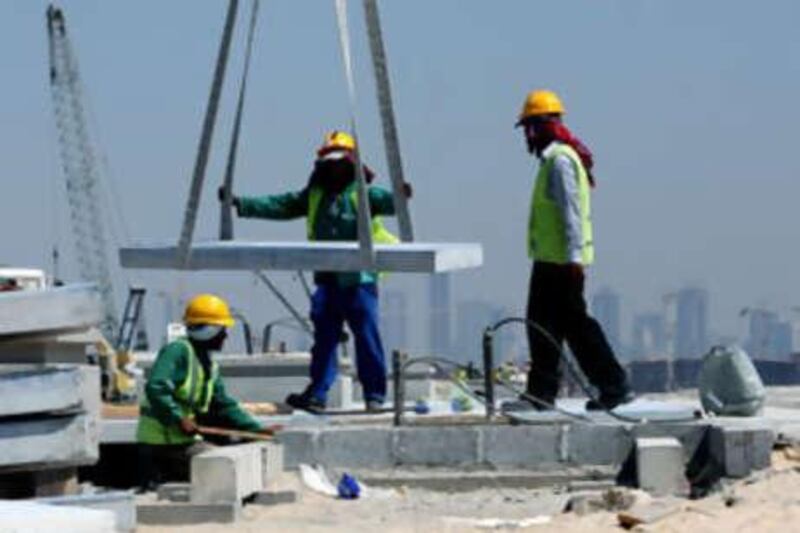Major property and infrastructure projects across the Emirates are under scrutiny as authorities review spending priorities in the face of the global credit crunch. Authorities in Abu Dhabi and Dubai say they have access to the funds needed to go ahead with projects already under way, but with banks retrenching, global bond markets in disarray, oil revenues falling and property sales slowing, they have begun examining projects in the planning stages to determine whether they still make sense.
Some ambitious projects could be scaled back or shelved, property developments could be tailored more towards middle-class housing and large-scale projects refinanced through shorter-term loans. "Everybody in the world is re-prioritising," said Lee Tabler, the chief executive of the Tourism Development and Investment Company (TDIC), a government-owned developer of some of the largest hotels and tourist projects in Abu Dhabi.
He said TDIC's signature projects, such as the branches of the Louvre and Guggenheim museums on Saadiyat Island, would be finished on schedule because they were essential to the future of the tourism market. But Mr Tabler said TDIC was re-examining the development of several hotels and mixed-use buildings because of a lack of available credit. "We are in a very active discussion with the Government and the banks," he said. "Everything that we have already launched is full speed ahead, but we are looking at some of the projects we haven't announced yet... The debt market is a little more careful."
Mohammed Ali Alabbar, a member of the Executive Council of Dubai and the chairman of Emaar Properties, said Dubai was well-positioned to weather the crisis, with access to sufficient capital to repay all borrowing in the next 21 months. "We believe that a solid infrastructure is the runway for strong future growth," he said during a speech at the World Economic Forum's Global Agenda summit. Speaking on the sidelines of the Dubai conference in his capacity as the chairman of Emaar, he said his company would review projects to determine whether they were right for the market.
"If the world does not get better, we will have to re-evaluate our policies," Mr Alabbar said. "We will look at the situation in detail before making any decisions, but for now all planned development continues." He pointed out that Dubai was not driven by the real estate sector, and that re-exports and trading; tourism and retail; transportation and logistics; manufacturing; the free zones and the business hubs for IT, media, financial services, education and health care were the real drivers behind Dubai's economic boom. "The real estate sector's growth was Dubai's answer to the demand created by these traditional sectors. The real estate story of Dubai is now over a decade old and continuing demand will sustain its growth over the long term." Nakheel officials said their hallmark Palm Deira project remained on track during a tour of the development yesterday for reporters, but added they planned to move forward cautiously. Potential problems have spilt over into infrastructure as well. The Abu Dhabi Water and Electricity Authority (Adwea) is struggling to finance its new projects using traditional long-term financing. "This is a challenge for us," said Abdulla Saif al Nuaimi, the director of privatisation at Adwea, at a separate conference in Abu Dhabi sponsored by MEED. "The markets are not like before." The company is seeking short-term financing to prevent projects from stalling, although the bridge loans are likely to cost the company more money. When the debt market recovered, Adwea would go back into the market to refinance, Mr Nuaimi said. Authorities are grappling with how to proceed after global credit markets seized up in September, triggering a slide into what is now expected to be one of the worst world recessions in decades. GCC countries initially hoped to sidestep much of the impact of the collapse of the US housing market, and the subsequent damage to the financial systems that followed in the United States and Europe. But as big global banks pulled back lending and investors fled developing markets, GCC banks have been unable to borrow the funds in international markets to lend to local developers and issuing bonds has become all but impossible with so few interested investors. That has squeezed developers and projects, as lending has dried up at the same time as cash from sales has dropped sharply. Foreign investors are avoiding riskier emerging markets and local buyers need higher down payments to get financing for a home. Rose-Marie Kilzi, the leasing director of Great Properties in Dubai, said her firm's sales had halved since their peak of 10 to 15 sales a week in June. She said some people were offering properties for three quarters of the price they paid for them. "People are very careful about buying nowadays," Ms Kilzi said. "There is a recession all over the world and the financing is becoming very difficult." A slowdown in transactions is particularly painful for companies that fund construction with off-plan sales of units in a building. All but the largest and most well-funded use this method, and they will have to look the closest at delaying or cancelling projects, as well as laying off staff. Gurjit Singh, the chief property development officer of Sorouh Real Estate, said the market would see consolidations and a move toward more affordable housing. "We will see a shift toward the asset class in the highest demand," he said. "This is middle-class housing." Mr Singh said Sorouh had not yet been affected by the credit crisis because it had financing for current developments, but it could have an impact on future projects. "Sorouh is getting prepared for the next cycle," he said, adding the company was looking at revising prices and ensuring projects were geared toward end-users, not speculative buyers. These are issues that need to be at the front of every developer's mind." bhope@thenational.ae shafez@thenational.ae * With additional reporting by Travis Pantin






